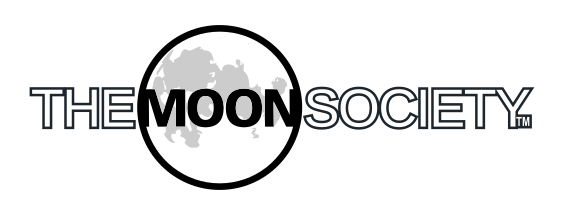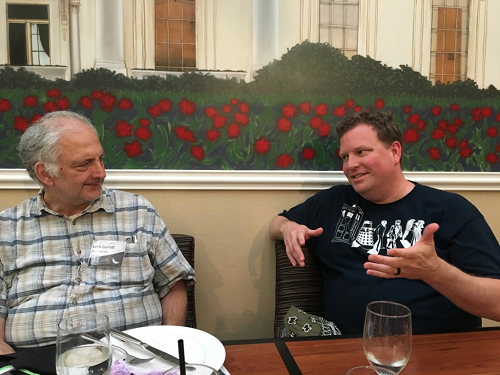Hi. I’m Ben Smith and this is a summary of my International Space Development Conference (ISDC) 2019 experience based on my notes. Overall, it was interesting and I had a good time. I’m not sure I’ll need to do it again however.
Wednesday, June 5
United delayed my flight 5 hours so I was unable to attend either of the pre-conference sessions (Space Policy Forum and Space Solar Power). I would have missed the morning session anyway. Which is disappointing as I’m interested in Solar Power Satellites.
Thursday, June 6
Morning Plenary – Keynote Speaker: Mark Sirangel
- Talked about March Storm and Fall Fury.
- Said that Apollo succeeded because of a willingness to tolerate failure and to sacrifice. They also had clearly understood goals.
- The next untapped space frontier is how we use the space data we collect. Apparently, we have more data than we can analyze and use. Most data is unorganized. We need new software to organize, store, and analyze data. We need to find the synergy between data sets. Commercial software can make money doing this.
Morning Track – Earth Independence (Achieving Earth Independence session)(The Earth Independence was my favorite track. I think this track had the most science and hard data.)
- Earth Independence: Introduction & Rationales. Dr. Doug Plata (The Space Development Network)
- Two types of Earth independence
- General independence – Not explicitly planned for. Independence “just happens”.
- Survival colony – Designed from the start to be independent as soon as possible.
- Self-sustaining (physical) ≠ self-sustaining (economic)
- A survival colony doesn’t rely on trade to survive.
- Needs
- Immediate (minutes to days)
- Air pressure
- Oxygen
- Temperature
- Power
- Electronics (control systems)
- Intermediate (weeks to months)
- Drinkable water
- Food
- Equipment repair/manufacturing
- Radiation protection
- Sanitation
- Later (years)
- Habitat expansion
- Isolation (infection)
- Sufficient gravity
- Information (tech and protocols)
- Genetic diversity
- Translocation (ability to leave the area when resources are depleted)
- Why survival colonies?
- Decreased cost
- Increased speed of growth
- Decreased number of launches
- Increased security and safety
- Decreased reliability on long supply chains
- Increased survival if something happens to Earth
- % mass independence = the amount of mass that does not come from Earth
- Top items (≈ 85% of total mass)
- Water
- Propellant
- Organics
- Metal
- Recycling is a powerful way to increase mass independence
- Top items (≈ 85% of total mass)
- Immediate (minutes to days)
- Two types of Earth independence
- Local Resources & Metallurgy. Dr. Philip Metzger (University of Central Florida – Florida Space Institute)
- Lunar resources
- Sunlight
- Real estate
- Vacuum
- Gravity
- Regolith
- Volatiles
- Recycling
- Shadowy (not permanent) regions might have sub-surface ice.
- At extremely low temperatures ice behavies like granite.
- 2% of Lunar soil is the remains of carbonaceous asteroid material.
- Ionic liquids can be used to separate specific metals from mongrel metals
- Advantages of on-site Lunar manufacturing
- Can build any shape and size. Doesn’t have to fit in a launch vehicle.
- Decreased launch costs
- Look at end product, then figure out the manufacturing.
- Lunar resources
- How Will We Produce Parts From Local Metals? Rion Motley (WetSpark Innovations, LLC)
- Types of metal working
- Heating/cooling/melting
- Plastic deformation
- Forging
- Bending
- Rolling
- Shearing
- Cutting
- Reduction
- Surface treatment
- Hardening
- Tempering
- Plasma cutters only needs electricity (no blades to produce/replace)
- Types of metal working
- NSS Student Space Settlement Contest Presentation
- The kids had an interesting idea (they all did) but I didn’t take notes.
- Producing Chemicals Needed by the Colony. Dr. Jeffery Greenblatt (Emerging Futures, LLC)
- Plastics needed for many components and products
- Water/gas seals
- Food grade containers
- Elements needed for plastic production
- Carbon – most important
- Hydrogen
- Nitrogen
- Oxygen
- Chlorine – most likely the limiting element
- Plastic production will yield other useful organic and inorganic compounds
- Cleaners
- Epoxy
- Outgassing of plastics into habitat is an issue.
- Can be designed into air scrubbing equipment.
- Plastics needed for many components and products
Morning tracks not attended – New Launchers, Space Infrastructure, Space Solar Power.
Lunch – Met Keith and checked out the student posters.
Afternoon Track – Moon (Visions and Policy session) (While interesting, I didn’t take many notes. If I could do it over, I would have attended the Space Solar Power session. Plus, several of the speakers didn’t show for the session, which was a bit annoying.). Here’s the notes I took for this session. I don’t know which speaker they belong to.
- Most of humanity is poor. Solar Power Satellites can provide a dramatic increase in available energy for everyone. This will raise humanity out of poverty. Other space resources can do the same. Then we, as a species, can accomplish much more.
- For All Moonkind wants to establish international law to protect the Apollo landing sites (equipment, footprints, etc.). I think it’s a great idea.
- Space settlement – What’s in it for Earth? (I’m not sure if this was from a speaker or just my own thoughts. It’s just in my notes)
- Planetary defense (asteroids and comets)
- Fix the climate crisis (Solar Power Satellites, resources, population escape valve)
- Hope/inspiration
- Science (new tech and spin-offs)
- Entertainment
- Raise humanity from poverty
- Morality (create multiple backups for Earth life)
- Freedom (find/make many different communities)
- Space metals will allow us to stop mining the Earth
Afternoon tracks not attended – Space Business, Space Solar Power, Space Business
Evening – Nothing exciting. Checked out the NSS Chapters meeting (I only stayed a few minutes they seemed to be arguing over something boring), had dinner, scoped out the Cocktail Reception (boring), and watched a few minutes of the movie, “First to the Moon: The Journey of Apollo” (I would watch this at home but I couldn’t get into it then). Then back to my room to watch an X-Men movie.
Overall, a pretty good day. I learned a lot and got to meet Keith.

